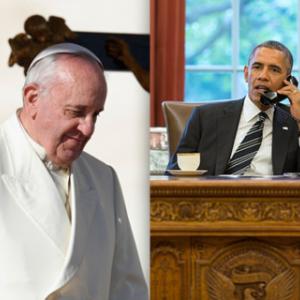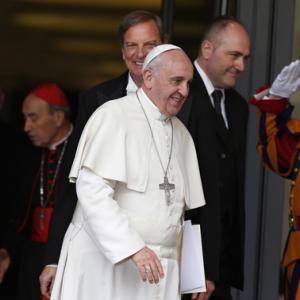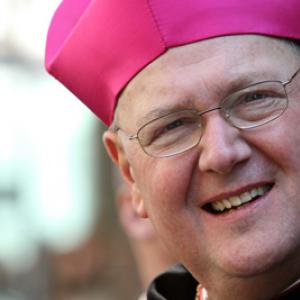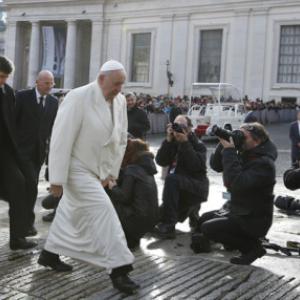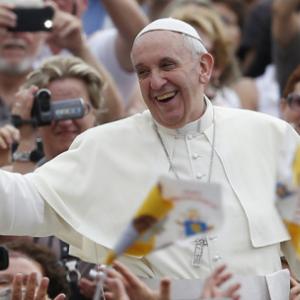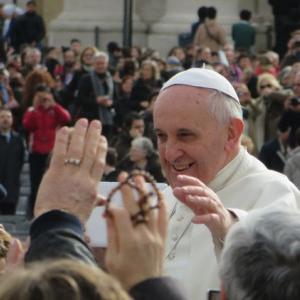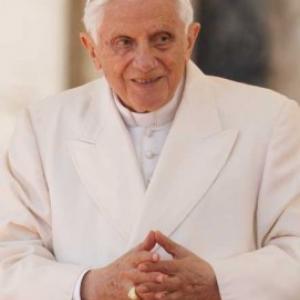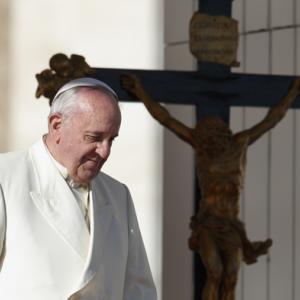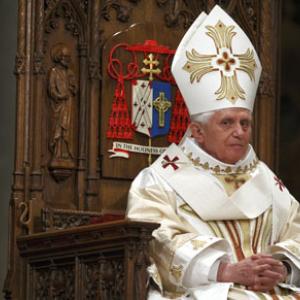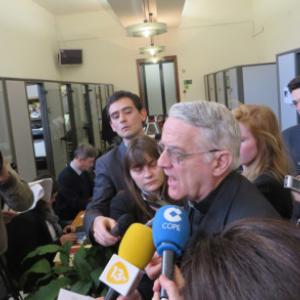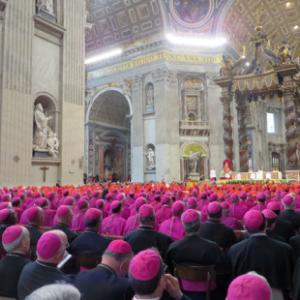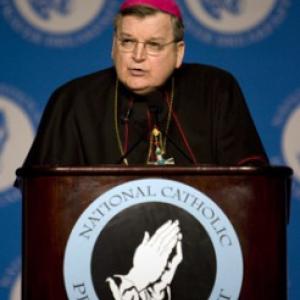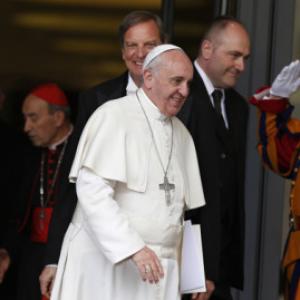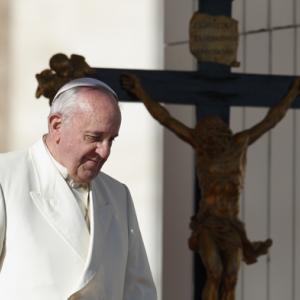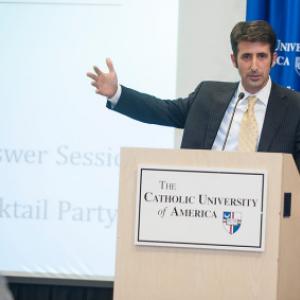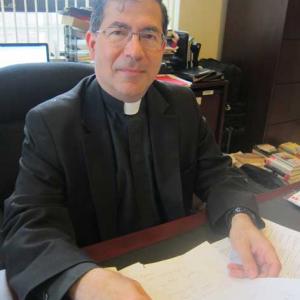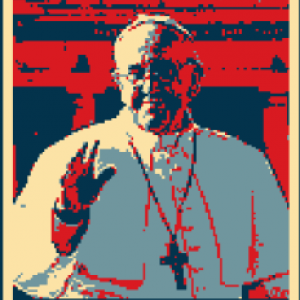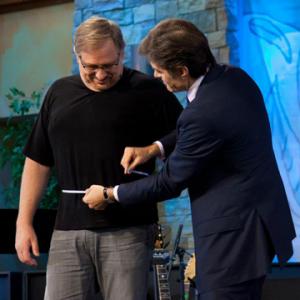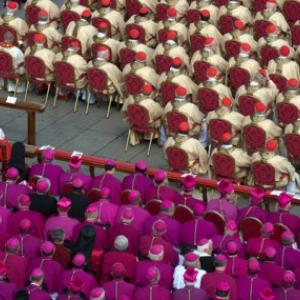David Gibson is an award-winning religion journalist, author, filmmaker, and a convert to Catholicism. He came by all those vocations by accident, or Providence, during a longer-than-expected sojourn in Rome in the 1980s.
Gibson began his journalistic career as a walk-on sports editor and columnist at The International Courier, a tiny daily in Rome serving Italy's English-language community. He then found work as a newscaster across the Tiber at Vatican Radio, an entity he sees as a cross between NPR and Armed Forces Radio for the pope. The Jesuits who ran the radio were charitable enough to hire Gibson even though he had no radio background, could not pronounce the name "Karol Wojtyla" (go ahead -- try it) and wasn't Catholic --- at the time.
When Gibson returned to the United States in 1990 he returned to print journalism to cover the religion beat in his native New Jersey for two dailies and to write for leading magazines and newspapers in the New York area. Among other journalism prizes, Gibson has won the Templeton Religion Reporter of the Year Award, the top honor for journalists covering religion in the secular press, and has twice won the top prize writing on religion from the American Academy of Religion.
Gibson currently writes for Religion News Service and until recently was covering the religion beat for AOL's Politics Daily. He blogs at Commonweal magazine, and has written two books on Catholic topics, the latest a biography of Pope Benedict XVI. He would like to write another -- but can’t seem to find the time.
He has co-written documentaries on early Christian and Jewish history for CNN, and recently worked on a March 2011 History Channel special on the Vatican. He currently has several other film projects in development. Gibson has written for leading newspapers and magazines, including The New York Times, Newsweek, The Wall Street Journal, New York magazine, Boston magazine, Fortune, Commonweal, America and, yes, The Ladies Home Journal.
Gibson is a longtime member of the Religion Newswriters Association. He and his wife and daughter live in Brooklyn.
Posts By This Author
When Pope Francis Meets President Obama, Expect Collaboration Over Conflict
President Obama is to meet Pope Francis for the first time next week as Obama wraps up a European tour, a high-profile encounter between two major world leaders that appears to carry especially high stakes from the U.S. perspective.
The White House and the American bishops have been at loggerheads for years on a range of culture war issues, and on Tuesday, just two days before the Vatican meeting, the U.S. Supreme Court will hear oral arguments on the contraception mandate that has sparked fierce opposition from the U.S. hierarchy.
But American and Vatican officials say the talks may disappoint those hoping for fireworks, and that the summit is going to focus on collaboration much more than conflict.
What's It Like to Have Pope Francis as Your Boss? Depends Where You Work
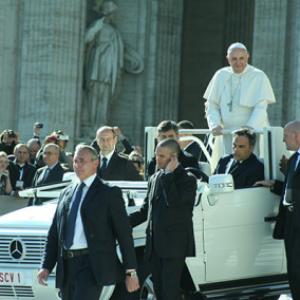
Couples gathered in St. Peter’s Square received a blessing from Pope Francis on Feb. 14. RNS photo: Eyal Baruch (www.eyalos.com)
So what’s it like to come to work every day when your boss is the pope?
Much also depends on whether you are one of the approximately 3,500 (mostly Italian) lay people in the Vatican’s workforce or one of the 1,100 or so cardinals, bishops, priests, or religious brothers and sisters who tend to occupy decision-making positions and are deeply invested in the policies that Francis adopts.
That second group, often defined by their ideologies and rivalries, tends to draw the most attention, given the high stakes and fierce passions involved.
To Understand Pope Francis, Look to the Jesuits
Figuring out why Pope Francis has upended so many expectations, how exactly he’s changed the Catholic Church in his first year and what he might be contemplating for the future has become a Catholic parlor game that is almost as popular as the pontiff himself.
A single key can best answer all of these questions: Francis’ longstanding identity as a Jesuit priest.
It’s an all-encompassing personal and professional definition that the former Cardinal Jorge Bergoglio brought with him from Buenos Aires, and one that continues to shape almost everything he does as Pope Francis.
“He may act like a Franciscan but he thinks like a Jesuit,” quipped the Rev. Thomas Reese, a fellow Jesuit who is a columnist for National Catholic Reporter.
Cardinal Dolan: Pope Francis Opened Door to Gay Civil Unions Debate
Cardinal Timothy Dolan said Sunday that Pope Francis is asking the Catholic Church to look at the possibility of recognizing civil unions for gay couples, although the archbishop of New York said that he would be “uncomfortable” if the church embraced that position.
Francis said the churches in various countries must account for those reasons when formulating public policy positions. “We must consider different cases and evaluate each particular case,” he said.
At 77, Pope Francis Keeps a Busy Pace, and Aides Keep Their Fingers Crossed
When cardinals gathered in the Sistine Chapel a year ago to choose a successor to Pope Benedict XVI, a frail 85-year-old who had become the first pope in six centuries to resign, many of them had one non-negotiable for the next pontiff: that he not be over 70 years old.
So what did the cardinals do? They elected 76-year-old Cardinal Jorge Bergoglio of Argentina — a man who had part of a lung removed in his 20s and who today “walks kind of crookedly,” as a former aide once put it, because he wears orthopedic shoes to help alleviate chronic lower back pain.
All in all, though, Pope Francis, now 77, seems to be doing quite well at the one-year mark of his papacy, despite maintaining a nonstop pace of liturgies, meetings, public appearances, and hours of prayer throughout a day that starts before 5 a.m.
“He eats works, it’s true,” said the Rev. Antonio Spadaro, a Jesuit priest — like Francis — who conducted a book-length interview with the pope last year and knows him well.
Pope Francis' Plan for Reform: Convert the Church
As Pope Francis approaches the one-year mark of his papacy, his global flock and a fascinated public are starting to measure the changes he is making against the sky-high hopes for transforming an institution many thought impervious to change.
Every personnel move and every new proposal is being scrutinized for what it might indicate about the direction of the church, what it might augur about possible adjustments to church teaching and whether the aspirations of so many will be fulfilled — or frustrated.
But as important as such structural and policy moves can be, church leaders and Vatican insiders say the 77-year-old Francis is really focused on a more ambitious (and perhaps more difficult) goal: overhauling and upending the institutional culture of Catholicism.
Francis, they say, is bent on converting the church, as it were, so that the faith is positioned to flourish in the future no matter who follows him to the throne of St. Peter.
Pope Francis: The Church Needs Better Bishops; Go Find Them
In another strongly worded message to the Catholic hierarchy, Pope Francis on Thursday told the Vatican body that vets nominees for bishops that they need to find him better candidates to send to dioceses around the world.
“To choose such ministers we all need to raise our sights, to move to a higher level,” Francis told the Congregation for Bishops, the critical department of the Roman Curia that acts as a clearinghouse for bishop nominees. “We can’t do anything less, and we can’t be content with the bare minimum.”
On consecutive days last weekend, Francis delivered stern warnings to 19 new cardinals he appointed to join about 150 others in the College of Cardinals: On Saturday, he told them to avoid “rivalry, jealousy, factions,” and at a Mass in the Vatican on Sunday, he said they must reject “habits and ways of acting typical of a court: intrigue, gossip, cliques, favoritism, and preferences.”
Benedict Rejects Rumors on Why he Resigned as 'Simply Absurd'
As the anniversary of his surprising resignation approaches, Pope Benedict XVI has rejected as “simply absurd” the speculation that he was forced to step down, and he said he still wears the distinctive white papal cassock for “purely practical reasons.”
“At the moment of my resignation there were no other clothes available,” Benedict wrote in a brief letter to an Italian journalist that was published on Wednesday.
The emeritus pope also said that he kept the name Benedict, rather than reverting to his birth name of Joseph Ratzinger, because it was a simple solution.
Pope Francis Blasts Arms Dealers, Decries Indifference to War
Pope Francis on Tuesday lashed out at public indifference to the many wars raging around the globe, with especially harsh words for arms makers who he said profit from the violence and suffering.
“Think of the starving children in the refugee camps. Just think of them: this is fruit of war!” Francis said at the daily Mass he celebrates in the chapel of the Vatican guesthouse where he lives.
“And if you want,” he continued, “think of the great dining halls, of the parties thrown by the bosses of the weapons industry that makes the arms that wind up [in those camps]. A sick child, starving, in a refugee camp — and the great parties, the fine life for those who manufacture weapons.”
The Surprising Afterlife of Pope Benedict XVI
When Pope Benedict XVI officially left the Vatican in a helicopter a year ago this week, becoming the first pontiff in 600 years to resign, many in his conservative fan base were aghast, even angry.
He has betrayed us, said those who thought Benedict’s papacy would be the final triumph of old-school Catholicism. He has undermined the papacy itself, they worried. Lightning even struck the cupola of St. Peter’s Basilica hours after Benedict departed, surely a bad omen.
Rumors that he was suffering from a terminal illness were taken as gospel truth. After all, what else could explain Benedict’s unorthodox decision to abandon the Throne of St. Peter?
Pope Francis Overhauls Vatican Finances, Names Australian Cardinal as Comptroller
Pope Francis on Monday launched a sweeping reform of the Vatican’s scandal-plagued financial system by naming one of his closest advisers on reform, Australian Cardinal George Pell, to head a powerful new department that will oversee the Vatican bank and the entire economic system of the Holy See.
The new Secretariat for the Economy, with Pell acting as a unique kind of Vatican comptroller, will have “authority over all economic and administrative activities” in the Vatican, according to a statement summarizing Francis’ decree.
The changes also provide for an official who will be empowered “to conduct audits of any agency of the Holy See and Vatican City State at any time” — a remarkable degree of authority in a bureaucracy where offices are known for zealously guarding their own turf.
Pope Francis Charges Cardinals to Oppose 'Any Discrimination'
Pope Francis created his first batch of new cardinals on Saturday and used the ceremony to launch a new appeal for peace amid the violence racking so many countries.
Francis focused his remarks on the plight of Christians, but in an extemporaneous addition to his prepared text he also called on the church “to fight any discrimination” and “exclusion.”
“The church needs your compassion, especially at this time of pain and suffering for so many countries throughout the world,” Francis told the 18 new cardinals who were present in St. Peter’s Basilica, along with hundreds of other cardinals and bishops whose colorful vestments and diverse origins offered a grand tableau of global Catholicism.
U.S. Cardinal Raymond Burke: Pope Francis Opposes Abortion and Gay Marriage
As Pope Francis led the world’s cardinals in talks aimed at shifting the church’s emphasis from following rules to preaching mercy, a senior American cardinal took to the pages of the Vatican newspaper on Friday to reassure conservatives that Francis remains opposed to abortion and gay marriage.
Cardinal Raymond Burke acknowledged that the pope has said the church “cannot insist only on issues related to abortion, gay marriage, and the use of contraceptive methods.” But in his toughly worded column in L’Osservatore Romano, the former archbishop of St. Louis blasted those “whose hearts are hardened against the truth” for trying to twist Francis’ words to their own ends.
Burke, an outspoken conservative who has headed the Vatican’s highest court since 2008, said Francis in fact strongly backs the church’s teaching on those topics. He said the pope is simply trying to find ways to convince people to hear the church’s message despite the “galloping de-Christianization in the West.”
Pope Francis Calls for Flexibility, Patience as He Opens Talks on Church Teaching
Pope Francis on Thursday opened a major two-day meeting on the church’s approach to the complexities of modern family life, telling the world’s Catholic cardinals that the church needs a “pastoral” approach that is “intelligent, courageous, and full of love” and not focused on abstract arguments.
In brief introductory remarks released by the Vatican, Francis pushed the closed-door summit of about 150 cardinals to “deepen the theology of the family and discern the pastoral practices which our present situation requires.”
He asked that they do so “thoughtfully” and by keeping the focus on “the beauty of family and marriage” while at the same time showing that the church is ready to help spouses “amid so many difficulties.” Francis added the phrase “intelligent, courageous, and full of love” extemporaneously.
Cardinals Gather in Rome as Debates on Church Reform Heat Up
High-level debates over Catholic teachings on marriage and divorce and other hot-button issues heated up on Wednesday as a highly anticipated effort to overhaul the Vatican bureaucracy slogged through the devilish details of financial reform.
The multitrack talks launched months ago by Pope Francis ramped up this week as some 185 cardinals converged on Rome to watch the pontiff add 19 new members to their select ranks this weekend, part of what some called “the most critical week” of Francis’ year-old papacy.
Anticipation is mounting for a series of closed-door discussions on Thursday and Friday, when the cardinals will hold what are expected to be frank talks about issues such as contraception, cohabitation, gay marriage, and whether divorced and remarried Catholics can receive Communion.
More Protests Over Koch Gift to Catholic University of America
A group of leading Catholic activists and academics has renewed criticism of Catholic University of America over a large gift from the billionaire industrialist and conservative funder Charles Koch, and over a school official’s statements that seem to endorse Koch’s questioning of climate change and the right of public workers to unionize.
In a letter sent on Monday to CUA President John Garvey and Andrew Abela, dean of CUA’s new business school, more than 50 Catholic signatories said Charles Koch and his brother, David, “have a clear political and ideological agenda.”
The Kochs’ libertarian-leaning positions, they said, “are in direct conflict with traditional Catholic values.”
Anti-Abortion Activist Frank Pavone Is Back in Church's Good Graces
The Rev. Frank Pavone, head of Priests for Life and a leading anti-abortion crusader, was braving freezing temperatures with thousands of others at the annual March for Life on Wednesday, but at least he can look forward to a warm embrace from the Catholic Church.
After years of tensions with various bishops, Pavone has complied with demands to straighten out the group’s finances and to become accountable to his home diocese in New York.
The news came in a December letter sent to the nation’s Catholic bishops by Bishop Patrick J. Zurek of Amarillo, Texas, where Priests for Life has been based for several years.
The Pope and the President: What to Look for in the Obama-Francis Summit
The news that President Obama will meet with Pope Francis on March 27 brightened a snowy Tuesday morning for Catholics who see a broad overlap between the president’s agenda and the pontiff’s repeated denunciations of income inequality and “trickle down” economics, and his support for the poor and migrants.
Other Catholics, especially conservatives already unsettled by Francis’ new approach, hoped that the pope would use the encounter at the Vatican to wag a finger at Obama over the president’s support for abortion rights and gay marriage.
So what will the two leaders talk about? What issues will they avoid? With Francis, anything is possible, but here are some initial ideas on how the summit could play out:
Top 12 Pastor Stunts: Living as an Atheist Is Just the Latest Ministry Gimmick
A California pastor made headlines this month when he announced that he will live like an atheist for a year to see what it’s like on the other side of belief. But Ryan Bell is actually just the latest “stunt pastor” to use unorthodox means to draw attention to his message.
In recent years, other church leaders have challenged congregants to have sex (with their spouse) for 30 days straight or have dressed like homeless people or lived in a tiny box or on a spacious roof in order to gin up attention, attendance, or funds.
This kind of reality-show piety has a history, of sorts, especially in Christianity: A fifth-century ascetic, Simeon Stylites, achieved great fame by living — subsisting, really – atop a pillar for some 37 years.
But the rise of the entertainment industry, combined with a focus on marketing techniques to preach the faith or build up a church, have sparked a penchant for ministry gimmicks that go well beyond the old dunk tank.
Pope Francis' Cardinals Point the Way To Catholicism's Future
In naming his first batch of new cardinals on Sunday, Pope Francis made some surprising choices that largely confirmed the characteristics he wants in the Catholic Church he leads: a greater focus on the poor, a bigger voice for the Global South and a reduced emphasis on the traditional hierarchical perks.
True to form, Francis wrote each of the new cardinals and stressed that the new title “does not imply promotion.” He asked them to refrain “from any expression of worldliness or from any form of celebration contrary to the evangelical spirit of austerity, sobriety and poverty.”
Some had expected Francis to leave his mark by pushing well beyond the ceiling of 120 cardinals under the age of 80 who are eligible to vote in a conclave.
